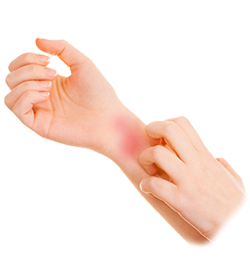
Q. and A. with Dr. Kiskila- This Month’s Topic: Hives
 Question- Dr. Kiskila, what are hives?
Question- Dr. Kiskila, what are hives?
Answer- Hives are red patches on the skin that are raised and usually itchy. They appear suddenly and often from an allergy, but hives also can happen for other unknown reasons. Typically, they resolve on their own.
Question- What triggers hives?
Answer- Most people get hives from an allergy to something. The most common allergies are medicines, such as antibiotics. Foods like shellfish, nuts, and eggs are also common. Certain products or natural substances can cause hives such as: detergents, lotions, plants, metals, or latex, or bug or insect bites. If you get hives for the first time, it is likely from something you came into contact for the first time, or developed an allergy to recently.
Question- What are the symptoms of hives? Do I have to worry about anaphylaxis?
Answer- Symptoms of hives are a red, raised rash that is typically itchy, and you can have some angioedema, or puffiness.
Symptoms of hives are a red, raised rash that is typically itchy, and you can have some angioedema, or puffiness. Anaphylaxis is serious, life-threatening allergic reaction. It’s typically a whole-body reaction and can happen suddenly. You should see a doctor right away if you have trouble breathing, feel tightness in your throat, vomiting, wheezing or fainting. These could be signs of anaphylaxis.
Question- What is the treatment for hives?
Answer- If your hives are caused from an allergy, then avoiding the allergen is ideal. But hives sometimes can also be caused by changes in body temperatures, after a shower or working out, or cold or hot air. Treatment is usually not needed since hives go away with time and removing the offending agent, but sometimes taking an antihistamine for itching is needed. If your hives don’t go away, doctors may sometimes prescribe a short term of steroid medications.
Question- How do I prevent getting hives?
Answer- If you know what you are allergic to, it’s best to avoid the triggers of hives. If you experience hives for the first time, you may not know what triggered them. Taking an antihistamine for allergies is helpful to avoid hives if you get hives often for things that you cannot avoid such as weather changes.
The information provided is for general interest only and should not be misconstrued as a diagnosis, prognosis or treatment recommendation. This information does not in any way constitute the practice of medicine, or any other health care profession. Readers are directed to consult their health care provider regarding their specific health situation. Marque Medical is not liable for any action taken by a reader based upon this information.

